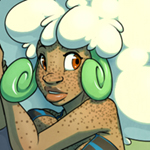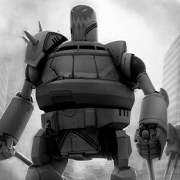|
Agreed with the above. This was probably the best way to experience the game, and I'm eagerly awaiting the rest of the videos. My only real thought on the games is that the 'online' game feels to me like the reason Coda's making all these comments is to distance himself from them. He attributes them to another person, so he can say what he wants without feeling like he's the one making the statement.
|
|
|
|

|
| # ? Apr 26, 2024 21:11 |
|
Thank you to everybody for all the positive feedback! I apologize for the relative lack of interaction; this week is really busy and I don't have time to do much beyond getting the stuff up. Speaking of getting stuff up, though, here's the next video! 
|
|
|
|
The Laplace Demon posted:I want to touch on Matt's last comment about Coda possibly lying. The Great and Lovely Descent might be the first of a series of responses to Davey's need for solutions and endings from Coda. So, as the most recent video shows, this isn't right, since coda and davey didn't meet until during the creation of the 'connected to the internet' game The Great Decent might be (and in places explicitly has been) edited by Davey, but it wasn't made with knowledge of Davey even existing, let alone his opinions. So all the games in episode one were made by Coda before meeting Davey, with edits in places by Davey. And really, the narrative I get here is a guy getting interested in game design. He messes around with making a counterstrike map, and moves on into trying his own stuff. He makes his own shooter, and when it has a neat bug, he drops it hard tries to get that kinda feeling more, making a small tight narrative piece that's played weirdly in a specific way to convey a message. The walking backward, with a lot of triggers to change the environment as you go Then he makes a level to sort of work out his ideas, and replicate the process of getting ideas, how it can be slow, even when the goal is right there and nothing's in your way. He makes a level that's just making LOTS of level. Like, we see the door puzzle, and a guided "You can only go one way" deal, but he probably tried other things in that big web of level, and we just saw like, what section davey felt was important and got meaning from. Then he made The Great and Lovely Decent which is like, this is big, it's a clear concept, and has a little bit of story to it. This is probably the most gamey thing Coda has made, and he's clearly got a lot of interest in all this. So now, or maybe during this process, he goes out to a game jam, or has gone to a couple, and meets Davey. When coda met davey, and the knowledge that davey edits games (Later Davey is going to list a few games he explicitly shared while still talking with coda) is an important thing to keep in mind when like, trying to tell what's going on in the games, and who or what is behind it.
|
|
|
|
FicusArt posted:So, as the most recent video shows, this isn't right, since coda and davey didn't meet until during the creation of the 'connected to the internet' game Ficus, taking my points before I can make them! I do have some other points to address. For starters, I don't agree with Davey's interpretation of the Puzzle at all. That is, he says Coda knows its solution, and it makes a good way to tie up a project and leave it behind. However, every time something in-game comments on the puzzle, either the notes in that level, cube-headed people talking, or the voice from that level before The Machine, it's about how the puzzle absolutely cannot be solved. Now, I'm not sure what the Puzzle does mean, but it's clear Davey's interpretation doesn't match with Coda's intent. The same with the dark space part of it, which is something you picked up on; Davey treats it as a space for a short reflection, but Coda very clearly likes spending as much time as possible in the space between doors. Which brings me to my next point, here a disagreement with you rather than with Davey. Personally, I do find that dark space, and particularly the version of it in the housecleaning game, to be relaxing. It seemed not right to me the first time it showed up, but it has since grown on me. Especially the music during the housecleaning, even if it is a bit repetitive I still enjoy the soothing guitar and vocals. I do understand that this is particularly subjective, though. If somebody published a free housecleaning game on itch.io, I would be the kind of person to just play that for a fair while. But, not forever. Forever is what Coda wants from that space, and remember that the two months he spent making that game, he was happy. However, Davey can't take it for even 10 minutes, and just has to drag everything through the door on to the next game. One final thing that didn't quite show up in the video since you stopped right in the doorway, but that space looks very poor from that side of the door. Just a small block of land, completely featureless void surrounding it, and if you step out a bit and look back the trees are clearly just floating in space. All of this, in the same level where it was brought up that the graphical quality has greatly improved compared to past games. The point is clear: the player was never supposed to reach that space, and yet that's where Davey planted his lamp-post. Oblivion4568238 fucked around with this message at 04:06 on Oct 22, 2015 |
|
|
|
"But Coda doesn't have that voice telling him to stop." As if Davey can hear what's going on in Coda's head. Davey assumes that Coda's final prison level works because the player's voice tells whoever's on the other line that it's going to be okay, but clearly the listener is confused, frustrated even, by this vague "Believe In Yourself!" type of solution. There's nothing concrete about "just be sincere" or "just tell me how you feel," and that isn't helping fix the problem. If the listener needs help, what the player should provide is clear concise solutions, especially if from their point of view they know the answers. I'm going to say, as someone who has times of depression and anxiety, I appreciate much more when someone tells me what exactly I can do other than "feel better." Even a simple exercise to relieve the struggling is more useful to me than "feel different." In that sense, the final prison game is still very much like a prison. It doesn't have a solution, the listener is still trapped and the player can't describe the steps except in esoteric mantras. The player starts at the goal instead of explaining the steps to get there. Sure, it feels kinda nice, but it doesn't "solve" anything. And then Davey cuts us off and throws us into something different while we're still absorbing the information. It was nice to experience these games without sound, because Davey makes everything feel hurried and frantic, even in the more somber levels. Oblivion4568238 posted:But I did just remember I had something to add to that. Davey is so intrusive into Coda's work, he added a lamp-post to a game that Coda had made before they even met! Kinda rude! I see the area with the lamppost in Down and feel like it was built with the lamp as a central focus instead of off to one side (like with later levels), so it's my assumption that this one is intentional on Coda's part, not Davey's. The level after that (Notes), which Davey says is when he met Coda, had a lamppost just kinda... there, without purpose, taking up space in what would have been a fine ending room. If this is where Davey began his overenthusiastic push into Coda's life, that's a good representation of just how... I don't want to say "intrusive," but the kind of influence Davey is putting onto Coda. Like, I imagine that Davey's playing Down while Coda's working on Notes and says something like, "Hey, this lamppost is cool. Why not put it in as, like, a calling card or something?" And thus starts the argument about goals and solutions. E: v After having read the interpretation of Coda as a woman, it's hard not to think that there's some sort of transgender narrative going on. If Coda's games were only built for Coda, then logically it would be Coda doing his own voice work. If the voice in the game sounds effeminate and Davey refers to him in the masculine, then perhaps Coda is a transgender man. I'd meant to note it last video but now that the point's been brought up I'm willing to stand behind it. E2: But then there's the theater level! Ugh, I'm going to elaborate when we next see it, but maybe it has nothing to do with Coda's gender. Double May Care fucked around with this message at 04:22 on Oct 22, 2015 |
|
|
|
Oh yeah, one other point of observation is who is the girl coda keeps getting vocals from. Like, does it matter? is davey calling coda "he" out of courtesy to hide coda's identity a little? Is Coda a trans man? Was the cleaning game prompted by Coda getting into a romantic relationship with a lady friend (or a man friend)? Cause like, I don't think Coda ever gets masculine voice work, and when you're making games by yourself, you really just have your own voice, and those of your friends, to draw samples from. So either coda has an effeminate voice, or coda has been involving some girl with his creation process this whole time, giving another source of ruining davey's narrative of coda being a lonely loner. FicusArt fucked around with this message at 04:25 on Oct 22, 2015 |
|
|
|
A thought I had re: the black space between doors, and the last line of the most recent video (the narrator saying "you have to pick up and move on"). If you subscribe to the theory that games don't have a single definitive end, you don't actually have to leave the black space. Like, ever. That could be where the game "ends" for you. Actually "solving" the puzzle rarely leads to anything that I feel could be described as rewarding: cube-headed men who can't solve the puzzle from their side; a thousand typewriters; an orange room with a possibly edited-in lamp post. I don't know what this actually means, so maybe I'm totally on the wrong track. But it's something that stuck out to me, in regards to the discussion of games and their endings. Also the situation where you (the player-character) are on the phone with your past-self in the prison is very much evocative of the later game where you're about to crash into a door, especially because the 'solution' is described as 'saying something sincere' in both cases. (Getting ahead of myself, but I think this also ties into the game where you're trapped by walls displaying your earlier choices and you have to say that making games is fun and easy and satisfying &c, which would seem at that point to be insincere statements, but also freeing ones? A thought I'll keep in mind for when we get back there.) This game is so dense with meaning and I wish I were better at interpreting it.
|
|
|
|
Honestly, I thought that last one was particularly interesting for a completely different reason: Davey noted that Coda made a point of having them check this game in particular out, which would seem to imply that there's very much a message to Davey in there. So, looking at the actual content of the "game", and... You go into a house where you get soothing yet repetitive music. You get told exactly what to do, and when you do so, you basically get told that you're doing good for doing it. And you keep doing the same thing over and over until eventually, you get asked "do you enjoy this?" and then it ends. Once again, there's this element of solutions. In this case, you're given a pointlessly repetitive task that never ends, but you keep doing it anyways.
|
|
|
|
I had missed that angle. Now I just keep thinking like, what if what was happening was Coda was spending a couple months making this as a gotcha to Davey, and can't help but smile and laugh whenever he sees Davey (cause Coda's got this big joke he can't wait to pull on him) Then finally he's like "Here you gotta play this", shows Davey the game, and not only does Davey completely miss the point of it being meaningless, repetitive busy work that the player can play and 'accomplish', but then starts Davey psychoanalyzing Coda with it.
|
|
|
|
It was at this point I really noticed how much Dawey criticizes every choice that Coda does. And, it made me think of the title itself: The Beginner's Guide. I am not completely decided who is who, but it seems Dawey thinks of himself as a guide trying to teach Coda how to do things properly. But in the end he's just (maybe unwittingly) being hurtful, condescending and short-sighted.
|
|
|
|
So did you notice it during the house cleaning level? The creepy guy asks you to be perfect, it's not necessary to be perfect but still try to be perfect (the specific phrase is "how about you scrub [the bath] as best you can. No need to be perfect, we're all just human". Do these chores, now do them again. Isn't it soothing to see something done perfectly. Do it again. And again. This is fun. Do it again. Davey interrupts the game the moment when the question is asked: "Do you enjoy this?" (31:40) To me this level epitomizes one of the layers that The Beginner's Guide is about : two people (CODA and Davey) who are in an unsatisfying relationship. This level in particular seems to be CODA's attempt to show "this what how your demands feel to me", "this is my perspective of how we interact". It's a series of repetitive, unsatisfying chores - with the added emotional demand that the chores or the result of them (should) feel "nice". Additionally it's a one-way street - the player does all the work with nothing to gain in return. Davey himself enhances my suspicion of this, he says that CODA specifically asked him for his opinion, in a period where CODA was "grossly happy". CODA tries to get Davey to see things her way, and Davey goes out of his way to avoid answering. This contradicts the text of the final level (that none of these games were made for Davey) and I haven't figured out if these games were a way of coping or a way to communicate or just an outlet of frustration. But I just don't see the relationship between Davey and CODA as just audience and creator. It's far more personal between the two of them.
|
|
|
|
I always saw the cleaning level as make work. Do these simple tasks, just keep doing them, let them distract you from the cold and dark outside.
|
|
|
|
FicusArt posted:Then he made The Great and Lovely Decent which is like, this is big, it's a clear concept, and has a little bit of story to it. This is probably the most gamey thing Coda has made, and he's clearly got a lot of interest in all this. So now, or maybe during this process, he goes out to a game jam, or has gone to a couple, and meets Davey. I think there is an important thing to say about the Game Jam and how it relates to the concept of "Connected to the internet" A Game Jam is basically a place to discuss ideas of Game Development with other developers. The Connected to the internet game is very much "other people's" random thoughts on Coda's environment - It is a representation of the Game Jam itself a lot of voices giving opinions on your design of a game. Very much linking into the main theme of the game of Davey reading too much into it. The ending of Connected is very powerful to me too - It gives me a the sense of being overwhelmed with the other people giving praise and support. Giving what Davey says that he was a bit too pushy trying to get his attention the "Speak" very well may be him.
|
|
|
|
I have some thoughts at this point... For the first time (I think), Davey admits that he didn't get the point of a level. He says, "I really thought that's what it meant," which implies he later learned he was wrong about his interpretation of the level. So far, I think this game is ultimately Coda trying to portray a specific feeling, emotion, or a specific point about the nature of games, and Davey constantly missing that point, ironically because he is analyzing the game instead of experiencing it. Davey would rather psychoanalyze Coda rather than just experience Coda's art. He can't turn off his brain and just absorb the experience. It needs "goals" and "missions" and "stages" and such. It has to be a "game." Davey is more interested in "helping" Coda than he is in experiencing Coda's art. I say this only because it reminds me of my own frustrations with creating, so I know I might be projecting myself a little on this interpretation. But this is how I see it. One of the things that always annoyed me in English class was when we had to analyze poetry. Not because I don't think it's helpful or interesting, but because you defeat the purpose of a poem by analyzing it. Poetry is mean to be felt. It is interpreted by the heart, not the mind. It's not supposed to make perfect logical sense, it's supposed to make you feel a particular way. By picking it apart, by guessing at the motivations of the poet, or even worse saying one interpretation is 100% the correct one, you defeat the entire act of the poem. Once you've come to a logical conclusion, it "taints" however you experience that poem from that point onward. To enjoy poetry requires the reader to temporarily banish the logical mind and to simply experience the work with an open heart. You have to open yourself up. But to a lot of people, especially those on the autism spectrum, everything is more accessible if it is a puzzle to be solved with a reward at the end rather than a non-logical thing to be experienced without external reward. A poem is not necessarily a puzzle, yet we are trained to automatically approach it that way. I think Davey is missing the point of Coda's work by over-analyzing it. Like a poem, Coda's games are meant to be felt, not logically understood. And paradoxically, Davey's tendency to logically analyze the work causes him to miss the meaning entirely, because the meaning isn't so easily expressed in words. The meaning is a feeling. A state of being. Coda makes his games for himself, and that's why he's happy. It's self therapy. It's expression without consideration of how it will be received. Consider how Davey looks at that extremely repetitive, oppressive, weirdly off-putting housecleaning section and totally misses those cues. He says it's "peaceful" and "relaxing." The exact opposite of what the cues seem to be telling us. Even the dialog of the person, he ignores, because he's obsessed with psychoanalyzing Coda. With getting to know who Coda is. Davey's heart is closed. He must understand everything in a logical context, and thus he missed the "point" of the work. He thinks he's "helping" Coda by "finishing" the work. Coda's later frustration, I think, stems from Davey's inability to see that he's missing the point. The fact that Davey says "I really thought that's what it meant," plus what we've seen without narration, leads me to believe that eventually Davey sees his error, and that Davey is the "beginner" in this "Beginner's Guide." Spookyelectric fucked around with this message at 19:18 on Oct 22, 2015 |
|
|
|
buttassbutt (again, sorry for the lack of responsiveness. I'm scrambling to finish the editing on the final video so it can go up tomorrow, but it involves not just splicing together a lot of different recordings but actually going back and re-recording a 3-minute chunk of video to try and re-sync it with our commentary, and OF COURSE the chunk that got lost is the FINAL three minutes of The Tower... (anyway, my point is that hopefully it'll be up tomorrow, but it may be delayed until Saturday -- which is, not coincidentally, the next time I expect to have a spare breath to jump back into the conversation.)
|
|
|
|
So, still stand hard that in the machine level, the woman is Davey and the press is everyone Davey keeps sharing coda's games with. Like, it's actively hard for me to see that any other way. It's all about people judging coda's work, or coda's lack of releases. It's about sharing someone else's work to make you feel good. it's about how sharing and destroying are the same thing when it comes to Coda's games. Like, I can't take Davey's word that he only started sharing games after this one. That doesn't make ANY sense. The idea that Coda made a game so blatantly (to me) about "When you come to me it feels like torture/an interrogation" "You and all of your friends are crowding me and judging my work, you're acting like you have ownership of me" "you're using my work to validate yourself" "you act to your friends like you represent me" "sharing my games and destroying them is the same thing" "This behavior of yours is hurting me" and only then did Davey start sharing them? No, that's absurd. EDIT: And then, like 4 hours later, I think I misremembered the order, with davey saying he'd share games on the space ship game, before the machine level. FicusArt fucked around with this message at 07:21 on Oct 23, 2015 |
|
|
|
Oho, the theater one became a lot more interesting to me with the tones there. That adds a fun new level to it: The "story" of the game gives off this social anxiety disorder feeling, but the actual "other people"... Are fun to interact with. They make these fun tones when you bounce off of them and sometimes you can bounce off of multiple at once, and... it's so much more fun than actually continuing the story along. Somehow, it kind of makes me think of that little speech bubble in the puzzle room, just going "guys, it's not that bad here" off in the corner. For me, the most interesting part of the next game is actually the random torii: Symbolically, that's supposed to represent "crossing the threshold", leaving the realm of the material and into the realm of the divine. Everything after that has a very ethereal quality, with mist blocking your vision, and even inside the puzzle, the mist is bright and welcoming and once you're done with the puzzle, you explicitly pass through another torii before you reach the word room. The entire thing, along with the background sound, ends up giving the word room a very... J-Horror vibe, as though by doing what you're told to, you're actually doing something really bad that really can't be undone.
|
|
|
|
Speech time! Couldn't hold it in and the ball just kept rolling. The Island level is a result of Coda's isolation and not having anybody to "ground himself" with... Says Davey, the one who apparently gets sole access to Coda's work and doesn't understand why the games that he is explicitly given by their creator are signs of some destructive force in Coda's creative life. Mobius and Island are two sides of the same argument. Mobius is Coda's view of things; trapped in an awkward and possibly unwanted friendship with this badgering possibly-narcissistic Davey, who is represented by the door and "Truth," the door being that breaking point we've seen in Tower (Coda either telling Davey to stop contacting him, or hitting a creative wall because of Davey's influence) and "Truth" being what Coda may legitimately be feeling but in a different light from how Davey sees and interprets it. It's Davey's voice saying "Coda needs help, so I need to be a bigger force in his life," as opposed to Coda saying, "I need help because Davey is smothering me and I don't want to hurt him." Island is what Davey thinks is happening; Coda is lost somewhere in his own thoughts and needs someone to remind him that games ought to be "fun" and "rewarding." Everything the player does furthers that drive to get an ending, but it's hollow and ultimately pointless. We've seen that the dialogue trees basically lead to the same result no matter what's said, and to the physical player it's as simple as pushing a button. And in this game, one button does so much that it loses a lot of the meaning of having made a choice at all. Near the end, the player goes through the same "letting go of the past" puzzle, only it's not a puzzle anymore and they're following the steps because someone made them feel obligated. And every time the player tells the pink voice (the same voice as Truth, aka Davey per this analogy) exactly what the voice wants to hear instead of all the "downer" talk, the words keep cracking and exposing the image of someone imprisoned in what very well may be their own home. All in all, it's what Coda imagines that Davey thinks is the right course of action; that Coda asks for help and Davey, being such a good influence on his friend, takes him through the same old slog of lampposts, doors and lies that Coda is trying to avoid. Coda can't be creative with Davey's line of thinking but it's what Davey wants to see. Coda's just a machine pumping out games for Davey to psychoanalyze, and Coda doesn't have the heart to tell him no because Davey was "dealing with something" a couple years ago. Suddenly this project Coda had, that was cool and innovative in a postmodernist kinda way and helped sort through his own thoughts and feelings, is now a joyless chore because someone out there expects to get their hands on it and rip it apart for a "deeper meaning." How much of this story isn't being told? How many emails or DMs aren't being mentioned for the sake of showing the games "as they are"? How many times has Coda tried to let Davey down softly before caving in and sharing yet another deeply personal piece of his art? I mean, obviously we don't get to hear Coda's point of view directly, but why does Davey have to make this collection of someone else's games all about himself? Double May Care fucked around with this message at 08:34 on Oct 23, 2015 |
|
|
|
Looking at the machine again at the end of the update, the first thing it has always made me think of is the steam icon. However while you were refusing to work it realised the 'face' is very reminiscent of the 3 dots motif you see in many (all) of the games. Also, did the crying get Really hysterical because you walked around the prison there?
|
|
|
|
Rather Watch Them posted:
I'd argue that assuming Coda is trans is giving Davey credit that the narrative clearly shows he doesn't deserve. He lies explicitly and by omission continually, makes assumptions about Coda and for the player. Hell, replace the masculine pronouns with feminine ones in the game jam story and he comes off as a nearly stereotypical creepy Nice Guy that couldn't take a hint. And note that the games become darker as Davey pushes in more and more on Coda's personal space. Honestly, so much of the actual content of the games themselves pushes towards Coda as a woman, and the only counter argument is 'Davey uses male pronouns', which is a pretty flimsy argument when it's clear he's not a reliable source of info. Not to mention the wider context of the Beginner's Guide itself coming out in 2015. A year when feminism in games is a 'hot button' topic. I'm fairly sure the lamp-posts are just the most obvious changes, as the internet game has a bunch of notes that, to me, point to Davey's frustration with Coda's design philosophy and personal philosophy. Stuff like "I help people for the good feeling it gives me" and the frustration over the door that doesn't open and the puzzle. They strike me as, yes, possible satire from Coda, or she didn't put all of the notes in, and Davey added some himself, or maybe she used some of his interactions with her for the content.
|
|
|
|
What really heightens Coda's apparent self-loathing for me is the length of time it takes to make and develop a solid, working game. He would have had to work on these for months. My thoughts are also evolving as we learn more. I'd assumed that Davey was sharing these works since the beginning. Knowing what motivated him (according to himself) makes it seem less cruel and more human. Although the way he defends it now, before we know the consequences of his actions, seems to imply that he did know Coda didn't want his games to be seen by anyone else. How we appear to others is something we inherently want to control. I show "uncompleted" or personal works to friends all the time. They're often not representative of me as a whole, but they often represent me as I am in a particular moment of darkness. I'm comfortable showing that side of me to my friends because I trust them. But if any of them posted them online, I'd be horrified, regardless of the general reaction. Another thought: I do think Davey is genuinely worried about Coda. But there might also have been a little "living vicariously through Coda" going on here too...
|
|
|
|
IT IS DONE. Unlike the first run, after re-watching all the videos and mulling over it for a week... I think I actually got it basically right in the video itself. So, let me know what you think -- certainly, we didn't focus on all the little details and aspects considered in this thread, but questions of the implied story aside I feel like we more or less worked out the game's central message. (also, hooray, this is our first 100% complete LP since 2013! We still plan to get there eventually with The Talos Principle, but we're doing that one at a much more relaxed pace, and it feels pretty good to get an actually finished project under our belts again.)
|
|
|
|
So first off, great LP and congrats on finishing it. It's been super enjoyable to watch, and you really added a level to all this that I hadn't gotten before. Here's my take on what the game wants to tell you: Game analysis is fun and engaging. It gives a whole new aspect of enjoying and experiencing games. But consider what your words and actions are doing to others, namely the creator. Don't make Davey's mistakes, instead you should learn from them. I think the Beginner's Guide has been a guide for the person consuming and interpreting games. It's a warning against being an armchair psychologist, against starting with a conclusion and filling in details to support that. Don't disregard the wishes of the creator. Don't assume that every facet of a creation tells you something about the creator. Don't take ownership of what isn't yours. If a game means something to you, stop and think, does it mean that because of your experience? In general, don't make these beginner's mistakes. But no like, I think this game strongly wants to promote thinking about games and talking about them. The game invites you to do it with Davey, and Davey guides you through thinking through all these games. And when it gives you that gut punch of how Davey hurt Coda, and how dark the game gets, you've been primed to think about the game and it's meta narrative all over again. The game wants you to think about how Davey is wrong, and what really happened with Coda. Basically, Davey the developer is way too good for this game to just be a rejection of commentary and reading deeply into games, when it trains you to do just that. You are, in the end, supposed to be analyzing all the little things you have been during this LP. Read between the lines, try and tell why choices were made within the narrative of the game, and outside the narrative of the game. Why did Coda do a thing, why did Davey read it how he did, what did Davey change, why did Developer Davey add things? And ultimately I feel it's to promote responsibly analyzing other games and works of art. Like there's a little bit about relying entirely on external validation being bad, and needing to be whole on your own, and like, dang that's good advice and all and really impacts well at the end of the game, but it's just sort of like, there to support the rest of the message, like the how to avoid those mistakes Davey made. Or, thinking about it, maybe instead the entire game training you and priming you to think about games, is to really help you internalize that final message. To really give it all the thought it demands. The two seem pretty intertwined by this point in my post :v
|
|
|
|
The final two videos are such a major gut-punch for me as a creative -- I'm going to have to replay/re-experience this again and take notes (since I was just pleasure-watching this LP, really) but man. One of the things that really hits me is how Davey doesn't seem to realize that, since The Tower was specifically made for him, the intended POV character is, in all likelihood, supposed to be Davey himself. From that interpretation, the maze seems like it represents the relationship between Davey and Coda: it's invisible, because Davey fundamentally doesn't understand Coda, and so he keeps running into these walls of rejection. Perhaps more importantly, the only way it seems possible to make it through the maze is by Davey's altering the game to create his own solution. It's telling that just after this, Davey tells you that he could only understand the chore-game by altering it to create something that he could understand. I had a lot more thoughts while watching, and I hope I can recapture them in this thread's lifetime.
|
|
|
|
Personally I get the most enjoyment out of this game just taking it at face value, as a story about a broken, deluded man losing his narcissistic coping mechanism and spiraling into despair over it. I sure as poo poo don't care what the creator of The Stanley Parable has to say about videogames but divorced from that I thought it was pretty good.
|
|
|
|
Got one small thing to add to this the invisible maze is literally impossible there is a solid wall of pain infront of the other stairs. I don't think there is any of the three dots you missed other then the ones in whisper. The why we create question is interesting and things like this and Cloud Atlas give me hope and inspiration. Shaded Spriter fucked around with this message at 20:26 on Oct 30, 2015 |
|
|
|
That was another thing I was gonna ask, about the three dots disappearing. When (as in, in which game and onward) did that begin happening?
|
|
|
|
I feel I've already proven myself to be bad at analyzing the story in the game in this thread, but I think it would be worth talking about the meta-story a bit; that is, what does Developer Davey think about this game, The Beginner's Guide itself? The story of Coda and Narrator Davey is certainly an interesting one, but I feel it's worth knowing what brought Developer Davey to make that story. After the release of the standalone version of The Stanley Parable, Davey ended up in bit of a dark place. The success got to him, and some of what's in that link is clearly reflected in the character Davey he made for this game. I think it's interesting, to see a bit of what likely inspired the creation of The Beginner's Guide.
|
|
|
|
This game resonates with me on multiple levels. I wrote fictions and supplements for a trading card/roleplaying game for the last four years, and the franchise was just sold to another company with their own creative team, so I have no idea if I will ever get to write for that game again. Or professionally write anything ever again. And I used to think that I just wrote fictions for my own enjoyment, but when suddenly it seemed I would no longer have an "official" voice in the franchise, I suddenly realized that I do create mostly for external validation. Which frankly made me feel cheap and makes me wonder if I am doing what I do for the wrong reasons. This game really speaks to me in that way. This game so perfectly encapsulates the creative process to me. It blows me away. It's like Coda is speaking my thoughts when he asserts that depression and low points are part of the creative process. And the commentary on analyzing a work, changing the meaning of a work through projection, the inherent futility of communication and creation... this really speaks to me. It challenged my interpretation of "walking simulators" and video games in general. There is so much said in this game, and arguably there was no "game" at all! This really touched me. I can relate to Narrator Davey so much it's not even funny. Like, holy crap. Well done. Also, fantastic LP! Congratulations! I looked forward to your updates every day. Spookyelectric fucked around with this message at 19:06 on Oct 24, 2015 |
|
|
|
Wow! This was absolutely a fantastic way to re-experience the game. Thank you both for making this LP and creating a new lens to see the game without the distortions created by the Davey-Narration. I have some interpretations I haven't seen come up in the thread yet that I'm surprised haven't already been proposed. The chore game as an OCD simulator: I don't personally myself have OCD, but a lot of my friends have it and describe it like "You keep expecting an ending but it never comes" and "the voice that tells you you've finished the task and are done now never comes." There are theories that it comes from a failure to "cross off items on the mental to-do list." So you have your list of tasks to do that day, all house-cleaning chores for the sake of this text. You clear the table, make the bed, fix the pillows, etc. and you get to the end and go "Oh, I'm forgetting something, something's still not right" and you return to the top of the list where nothing has been checked off, and you go "oh right I have to clear the table." In real life, you just cleared the table, but you still have to do this. This is what results in little OCD-characteristic rituals which are meant to somehow result in "I cleared the table" even when there was nothing to clear off. In the game, all the chores actually reset. You never actually clear the table, so you clear it again. It keeps going in an infinite loop. Even though everything around you seems fine with nice music and atmosphere, and you have your reassuring Clean friend (who represents OCD, giving out the orders) reassuring you that what you're doing is reasonable and fine and not at all bad for you, using little sayings like "a tidy home is a tidy soul", you, the player, still get unnerved by the repetition, the never-ending, and if you were to keep playing it, how much time it would take out of your life. This also lines up really well with the prison game where you have to complete a sequence of arbitrary actions in order to escape. "I just have to go turn the light off and on, move the couch, and then touch the shelf, before I can leave the house today" is just like stuff my OCD friends have described as OCD on a better day. Coda is actually not going through a particularly hard time anymore:" The games that Coda makes often seem to portray negative mental health states. What Davey misses, is that just because Coda is portraying something, doesn't mean she is actively going through it in that moment. A lot of the games about mental health do betray some kind of hint of self-awareness. Coda doesn't like solutions, and is offended by the idea that mental health and neuroatypicality is something to be "solved." (Which possibly works with the "Coda is autistic" theory). So Coda's game don't portray "solutions" to mental health problems, they just create relatable portrayals, which also convey the negativity of unhealthy behaviors. The stage game isn't just Coda beating herself up, she's showing the player the ways that the behavior in the game are unhealthy. When you're backing away and locking yourself up, it's not being portrayed as safe and good, it's being portrayed as unsettling. When the player, such as Davey, plays this game, they don't go "oh yup I'm bad at socializing this is great" they go "Wow this is scary and unhealthy." Where Davey goes wrong is projecting onto Coda the assumption that Coda isn't self-aware. Coda knows this is unsettling, that's why she's portraying it that way! If you only know Coda through her work, you might not realize that she's happy, or has developed healthy coping mechanisms. That perhaps she is further along in a healthy self-image than Davey is. (Davey does say she has a "wholeness" that he wants). Coda is making art, sometimes, about her past, not her present. Which is just what Developer Davey is doing in The Beginner's Guide. He's making a game that portrays his own self from 2013 through 2014. He is no longer the GOTY-obsessed depressed person. He at least knows enough about healthier thought patterns to portray and contrast them with his own. He is at least able to show us a world where we can see the problems he faced and learn from them, and he knows what we're supposed to be learning. (This might seem weird to anyone who hasn't faced serious mental heath problems, particularly personality disorders or other more serious "scary" mental illness, but if you ever try to write a story about a character with your problems working through them, it's impossible to complete until you yourself have worked through your own problems as much as the character has. Otherwise it's just impossible to put anything on the page. It's impossible for someone with BPD to write about someone with BPD realizing how to not fear abandonment without having already gotten to that point in their own life.) Davey (the character) hasn't worked through his own problems as far as Coda has. Coda sees Davey going through some poo poo, and some of it is stuff Coda can relate to, so she doesn't just cut Davey off. Maybe Davey will get the message? He'll see how unhealthy some of his patterns are through learning to enjoy games without solutions? But it backfires, and she gets caught in a toxic relationship she doesn't feel she can cut off. Davey needs things to have solutions, and when interpreting stories about Coda's past as cries for help relating to her present, he then needs to "solve" Coda. But we already know she has a relatively good self-image. Davey even says as such early on. "Even though Coda knew people thought of [her] as cold and distance, [she] said [she] knew [she] was really warm and kind". I also think that the door puzzle in the Tower is a part of this. Coda is saying "no, I'm not completely over my problems, but from your side of things these problems are impossible to solve. The switch is on the other side of the door, my side of the door." Coda makes lots of games, and might still make games, which Davey just doesn't know about. Coda has plenty of life outside of Davey. Davey keeps saying that Coda spends more and more time on each game. But I don't think, when he says "It took Coda 7 months to make this game" that that's really true. I think what's really going is "It took me 7 months to convince Coda to send me another game." I think over time Coda was trying to distance herself more and more from Davey, and so it's not that her games became more and more about Davey, but that the games she chose to send him were intentionally chosen. "Fine, you've been pestering me for four months. Here, play this game about how sick I am of you." We know Coda makes games for herself first and nobody else. Perhaps she made these games, for herself, about processing how she feels about Davey and this toxic relationship they have. Davey is basically stalking her in subtle ways. How did he even get old stuff like the counterstrike map? How did he know what she named her recycling bin? Coda sends Davey games just to appease him and get him to leave her alone for a bit. She sends him her games about him hoping he'll be able to empathize with her and will leave her alone. (Games as an artform are especially good at creating empathy, afterall.) Davey think he's Coda's only friend. Distancing yourself from Davey is distancing yourself from The World. For all we know, Coda has plenty of friends and life that Davey knows nothing about. The woman who voice acts in the Whisper Machine (the only voice actor besides Davey in the entire game) isn't necessarily Coda. Coda might just have a friend who isn't Davey who she asked to voice that line for her. Coda is Transgender, she is a transgender woman, and Davey is an rear end in a top hat Maybe I'm just projecting, but I think the fact that we all so strongly can see that Coda is really a woman isn't contradictory with Davey's narrator. We know Davey is terrible at respecting boundaries. Coda could still be a woman, and Davey could just be an rear end in a top hat that is mispronouning her the entire time. Trust me, poo poo like that happens all the time. Especially in cases where someone is being objectified and dehumanized. Davey could be so disrespectful of Coda's wishes, so into seeing Coda as who he wants to see Coda as, that he just keeps using he/him pronouns regardless of whoever Coda is. Coda might not be the kind of person who would correct someone, she doesn't seem too assertive. We don't know if Davey really even met Coda IRL post-game jam. Davey could have met a pre-transition Coda at the game jam, and is just completely oblivious to her transition because anything that isn't her game output just isn't important to him. (Remember how long it people many on the LP forums to realize when several trans LP-ers starting transitioning? "Why are you talking funny? Was that your name earlier? Oh well, I'll just keep referring to you as he") Davey also could have met an early transition Coda, who was far from "passing", assumed she was a man, and just wouldn't change his interpretation of her. A lot of Coda's game are not games about being trans like Dys4ia or anything. But they are definitely relatable for many trans people. A woman crying, trapped in a well-decorated prison? Talking to a past version of yourself about "what it's like now that I've escaped that prison?" Wanting to destroy your body to free the voice of a disembodied woman? Anxiety about the future, anxiety about "saying the truth about your feelings" to yourself, these are all incredibly relatable feelings that many trans women have even if they aren't specifically about what is unique to being trans. I don't know if Developer Davey intended any of this but it's definitely something that can be read into the character of Coda pretty easily. The Tower is about boundaries and Davey crossing boundaries I'm sure we all realized this, but I'm surprised nobody has commented on how the color red is used with vertical tower imagery. Over and over in the game, you come across tall red vertical shapes. Red, in western culture, is associated with the message STOP. Stop signs, red lights, warning, do not enter, all of these things are red. However, as the player playing the game, you never proceed without stepping around the red stop sign. Over and over you are presented with a boundary, sometimes a painful puzzle, but other times just big red signs to turn around, turn off the game, go away. You (Davey) sidesteps these boundaries and keeps going anyway. Likewise, the Tower is one of very few games Coda has made where you go up instead of down. If going down in Coda's games represents approaching more intimate thoughts and the subconscious, the constant ascent in The Tower is removing you (Davey) from that intimate place. All of the climbing is removing you from closeness and creating a safe distance.
|
|
|
|
I 100% agree with your interpretation that Coda's probably doing a lot better than it seems, and I also agree that it's likely that Coda's probably not showing Davey EVERY game, especially considering how overbearing Davey seems.
|
|
|
|
I'd like to add a little something. On the off chance any of you reading this haven't played through the game yet on your own or want to repeat the same experiment, there is an option buried in the game to turn off the audio commentary. I'm not sure how things advance if you do this, but it is in fact a thing to do that lets you still experience the game audio.
|
|
|
|
That is an option, but the other thing it does is disable the commentary-provided shortcuts. No warp past the maze in Whisper, no speed-up on the steps in that one game, and of course having to spend the full hour in prison in Down. Along with all the other things Narrator Davey did to cut out the middle of the games.
|
|
|
|
This LP has been a really cool way to re-experience this game, thanks for doing this. Now I'm going to TL;DR about my interpretation of this game's plot and how it's window into the mind of Davey Wreden (somewhat ironically given the game's theme of 'you can't really know someone from assumptions you form by consuming the art they create'): I found this talk by Davey Wreden really illuminating of the themes of the Beginner's Guide. Wreden talks extensively about his depression after the release of the Stanley Parable, and his self-destructive need for validation. Here's somethings I found particularly relevant: A major turning point in his depression was when his room-mate Robin (who Wreden was treating very poorly at the time) took him aside and told him that "Being around you makes me physically ill". This phrase was directly used in the Tower, as part of Coda's message to Davey. The 'For R.' dedication at the end of the game probably refers to Robin. The talk also gave me some idea as to the identities of Coda and Davey in the game. Wreden talks about both his isolation when he was making the Stanley Parable and his 'internal contract', the self destructive impulse for validation that subconsciously affects his actions. My theory is that Coda and Davey are both aspects of Wreden. Coda is isolated, like Wreden when he was working on the Mod version of Stanley. The parallel between the hour long wait in a prison cell and the sequence in the Stanley Parable remake where the player can press a button over and over for three hours to see a secret ending seems obvious. Statement first, playability second. Coda creates only for themself, because creation is enjoyable in and of itself. Davey represents Wreden's desire to be loved, to be popular, his 'internal contract'. The argument over 'playability' comes from this desire to create works that people will enjoy, not because he wants people to have fun, but because he wants to be praised for them. Davey changes and reinterprets Coda's work to be more palatable to the player, but in doing so fundamentally alters it. The act of exposing Coda's work to a wider audience is analogous to the sudden exposure Wreden experienced with the success of the Stanley remake. The break up sort of represents Wreden's deteriorating mental state. The game mirrors Wreden's recovery, his coming to terms with his Internal Contract and learning to ignore his need for validation. The game ends with Coda gone and Davey realising how badly he screwed up, he created the game to inspire Coda to make games again, but instead comes to terms with how awful his behaviour was. The messages in the Tower are as important a turning point for Davey as "Being around you makes me physically ill" was for Wreden. The ending seems pretty bleak but in reality Davey got his wish, we've just played through Coda's new game. Having heard Wreden talk about depression it seems really obvious to me that the whole Prison sequence is about just that. The talk on the phone doesn't read as a cop out to me, it reads as someone who has overcome their depression trying to help someone still suffering. There's no easy way out of the cell, but the knowledge that escape is possible, being told that things can get better by someone who has escaped, is worth a lot more than the more direct advice offered in the escape sequence, which turned out to be completely inapplicable to the prison they were actually trapped in. It's telling to me that one of the solutions is to just keep talking, to carry on engaging with someone, even if in context the player is talking to themselves. In short, The entire game is about Wreden getting over his depression and regaining his drive to create (Coda) by recognising and coming to terms with the reasons for his self destructive behaviour (Davey). It's a game about the emotional journey taken in order for the game to exist in the first place. At least, that's my take on it.
|
|
|
|
Oblivion4568238 posted:That is an option, but the other thing it does is disable the commentary-provided shortcuts. No warp past the maze in Whisper, no speed-up on the steps in that one game, and of course having to spend the full hour in prison in Down. Along with all the other things Narrator Davey did to cut out the middle of the games. Wait, does that mean the chore game loops forever?
|
|
|
|
I find it interesting that Wreden explicitly makes himself the antagonist of this work. He even provides an e-mail address for comments. That's pretty ballsy, considering he makes himself a sorta awful person with the meta-narrative.
|
|
|
|
Dr. Fetus posted:Wait, does that mean the chore game loops forever? No, though I had wondered if it would. The "ends" of each game are unaffected, just the shortcuts in the middle.
|
|
|
|
Oblivion4568238 posted:No, though I had wondered if it would. The "ends" of each game are unaffected, just the shortcuts in the middle. Does that mean they're stuck in that room in the tower forever?
|
|
|
|
SSNeoman posted:I find it interesting that Wreden explicitly makes himself the antagonist of this work. He even provides an e-mail address for comments. That's pretty ballsy, considering he makes himself a sorta awful person with the meta-narrative. Part of his recovery was to recognise and ignore this selfdestuctive impulse, to learn not to engage with everyone who contacted him. It's also interesting that Narrator!Davey reacts so badly to the Chat message cave and the various conversations with the player. He doesn't understand at all why someone would choose to be alone, how anyone can get validation without talking to another person.
|
|
|
|

|
| # ? Apr 26, 2024 21:11 |
|
Gloomy Rube posted:Does that mean they're stuck in that room in the tower forever? If I ever get there, I'll tell you. I've made it like 3/4s through the invisible maze before giving up and then not going back to it for quite a while. Someone in this thread said there's a solid wall at the end of that though, so I dunno.
|
|
|

























